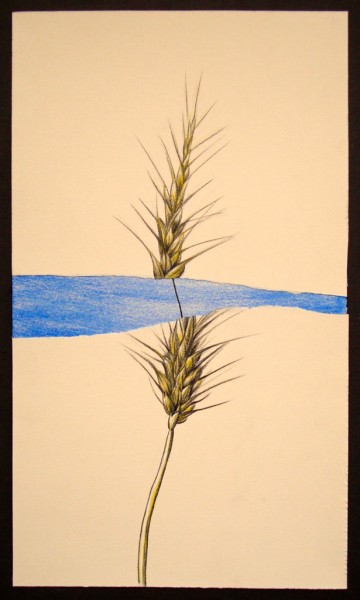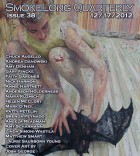The Father’s Guns
The father owned two guns, a rifle and a pistol. The rifle was for putting food on the table, and the pistol for keeping humans and other varmints off the nine-hundred acres sown with wheat and soybean and later, when the market tumbled, less than cattle-grade corn. The father showed all three sons how to shoot the rifle, but of the three, only Jeremiah, the youngest, took to hunting. Luke, the eldest, was a gangly, quiet kid who preferred to tinker with broken-down tractors. Martin, the middle son, cringed when a deer came into view and became a vegetarian and a minister. When he was six, Jeremiah shot his father’s hunting rifle and thought it the biggest gun in South Dakota; years later, he would find it insufficient for elk, terrorists, and other big game.
All three sons forgot about the pistol, although they knew it was kept in a box with a combination lock for safe-keeping. The mother did not forget about the pistol.
The Buck
When he was 17, Jeremiah packed his crossbow, arrows, and guitar and took Sheila up to the foothills that curved down to the edge of the farm. They made camp in an old deer blind, padding the ground with his sleeping bag and her woven wool blanket, and brought enough food and drink to keep them comfortable for a day or so.
They waited for the buck to wander through their campsite—they had seen the fine six-point pass through twice before—but by late morning they knew they would not see the deer until dusk, if they were lucky. He kissed Sheila, and then unbuttoned her jeans and stroked her lower stomach before burying himself between her thighs. When the thin wail of sirens from across the fields found them, they paused in their love-making. Clouds of yellow billowed from the field where Luke had been harvesting the winter wheat. Sheila whispered, maybe we should go back, and he looked at the dust, then at her lips red as just-plucked raspberries, but when he pulled her down and kissed her, he tasted dust.
The Bread
It was only a slice of bread, but after ten days of field rations and the thin unleavened nan-e the Afghans ate, it tasted the way Jeremiah imagined manna might taste. He sat on the edge of the rocky outcropping the hour before patrol began, the slice cupped in his palms. The smell of it brought him back to the fields, the grain rippling silver in what little breeze the summer could muster. To Sheila patting small wheat tortillas and frying them in the pan, to his brother’s warm house smelling of yeast and rye and cardamom. He thought of Maryam then, of the way she chewed the wooden end of the brush when contemplating a painting, of Martin watching him teach Josh power chords on the guitar, and for the first time since he arrived in Afghanistan, Jeremiah felt the space in his chest swell.
He tore off a small piece of the still-warm bread and let it dissolve in his mouth. The sun hovered two inches above the mountain ridge. He ate half the slice like that, tiny pieces of white dropped on his tongue, then wrapped the other half in a piece of paper to eat the next morning. Soon, he thought, I will hunt in the dark.
First Criticism
Two weeks after his birth, lying in the bassinet. “He disturbs me,” his father said to his mother. “His eyes. Why can’t he just sleep like our other two boys?”
Overheard
“There was nothing we could do,” the man in white said. “Nothing anyone could do. It is the way of God and nature to take the weak.” But the doctor let Sheila hold the gray infant swaddled in pink and white flannel, and her keening filled the hospital.
Dreams
For years, when he dreamt of sex, he dreamt it was Maryam who lay beside him. In his dreams she came to him, arms open, supplicant and soft, her pink robe slipping from her left shoulder. She was like falling into a nest of eider down. Often in his sleep, while dreaming this dream, he would turn to Sheila and she would curve into him, unknowing, and they would make sleepy love.
In the morning, he felt cleansed and confident, but as the day wore on and he remembered the way he held Maryam, the way she held him, he felt dirty for coveting his brother’s wife.
Self-Criticism
After the baby died, after Sheila left. “The only thing I’m good at is hunting.”
Reprise
When he heard the click beneath him, so quiet and unassuming, he was not sure, so he froze. But then, through his NVGs, he saw the wire, the faint outline of the IED. You goddamn idiot, he thought.
He tried not to tremble from the cold, the odd sensation growing hard in his gut. The Win Mag grew heavy on his shoulder, digging a groove, and he thought for a moment whether to turn it around, place the muzzle in his mouth, and pull, for that was a better, cleaner alternative.
But there was hope, always hope. When he did not return by daylight, base camp would search for him. Six hours he could stand stock still. Six hours he could wait.
The sky tilted, carrying the stars with it. His breath danced around him like a tired ghost in the frigid night. When he thought he could not stand still another instant, the edge of the sky melted crimson into the ridge. He closed his eyes, let the sun warm his face, a kind of benediction, and thought of Maryam standing by the window, the crunch of gravel as the car brought him closer, and Sheila, the way her body left a warm indent in their bed. He thought of the bread in his pocket, the way the soft crumbs dissolved in his mouth.



 The core workshop of SmokeLong Fitness is all in writing, so you can take part from anywhere at anytime. We are excited about creating a supportive, consistent and structured environment for flash writers to work on their craft in a community. We are thrilled and proud to say that our workshop participants have won, placed, or been listed in every major flash competition. Community works.
The core workshop of SmokeLong Fitness is all in writing, so you can take part from anywhere at anytime. We are excited about creating a supportive, consistent and structured environment for flash writers to work on their craft in a community. We are thrilled and proud to say that our workshop participants have won, placed, or been listed in every major flash competition. Community works.